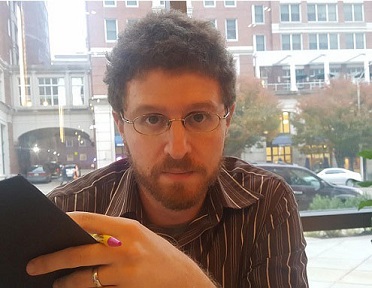Jeff Eden is an Assistant Professor of History at SMCM, and a (friendly) rival with our librarians for number of hours clocked at the library. With a recently published book and strong opinions about suitable guest lecturers, Jeff answered some questions for us about his research and the role of the library in scholarship.

How long have you been here at SMCM?
This is my second semester at SMCM. I love it here: the beauty of the place; my wonderful students and colleagues; the liberating atmosphere of “sanctioned weirdness”; the feeling of deep history all around; and the beet salad I had a while ago at our unusually good dining hall, which was the best beet salad I’ve had in my life. And I’ve lived a life rich with beet salads.
What is your academic background?
I got a Ph.D. at Harvard, an M.A. at Indiana U, a B.A. at the U of Chicago, and a Participation Trophy from the Owings Mills Little League Baseball “Minors Division” (1993).
What are your current research interests?
Right now I’m working on two projects: one about the Soviet Union during the Second World War, and one about slaves’ lives in Central Asia. My research agenda also includes dabbling, false starts, acid reflux, and awkward hallway smalltalk.
Tell us about your book (please)!
My most recent book is called Slavery and Empire in Central Asia (Cambridge, 2018), and I’ll let the official blurb take it from here: “The Central Asian slave trade swept hundreds of thousands of Iranians, Russians, and others into slavery during the eighteenth–nineteenth centuries. Drawing on eyewitness accounts, autobiographies, and newly-uncovered interviews with slaves, this book offers an unprecedented window into slaves’ lives and a penetrating examination of human trafficking. Slavery strained Central Asia’s relations with Russia, England, and Iran, and would serve as a major justification for the Russian conquest of this region in the 1860s–70s. Challenging the consensus that the Russian Empire abolished slavery with these conquests, Eden uses these documents to reveal that it was the slaves themselves who brought about their own emancipation by fomenting the largest slave uprising in the region’s history.”
How does the library help you in your research or the classroom?
Every research project I do starts with a tower of library books. The SMCM library’s collection is discerning and terrific, and our broader USMAI library system is the research resource that dreams are made of. Millions of books can be delivered right to the SMCM library circulation desk–one at a time, ideally!–within 2-4 days. And then there are the millions of articles available through the library’s online databases. And then there is Interlibrary Loan (ILL), which expands our reach from millions of sources to tens of millions.
What’s one thing you think students or faculty should know about the library, archives, or media center?
Students should definitely know the people. Librarians and archivists are experts in research methods and resources, and seeking their help is likely to yield great results. Their expertise extends to online research tech too: a couple weeks ago I learned some amazing Google search “hacks” from Kent Randell that I wish I’d learned years ago!
What are some interesting books or articles you’ve read recently?
The best book I’ve read recently is The Foundation Pit by Andrei Platonov– a dark, surreal satire of the Soviet Union written by a committed socialist & proud Soviet citizen. It’s one of those books where you keep trying to laugh and it keeps coming out as a deathly wheezing sound. For more modern (and less weird) stuff, the best book I’ve read lately is Zadie Smith’s Swing Time. It goes off the rails at times, but stick with it (and ignore the critics!)– it is wonderful.
Favorite reads, whether research related or not?
Fathers and Sons (Turgenev). The older I get, the better it gets. Loving this book is a requirement for passing my Russian Civilization class.
Favorite class you’ve taught?
I love all of my classes and all but one of my students.
(Yes, everyone but that mean guy back in 2013, when I was a TA. Why was he so mean? I hope he’s alright…)
If you could invite anyone, dead or alive, to guest lecture in your class, who would it be?
The only right answer is Genghis Khan. Deduct points for any other answer.
What else would you like our readers to know?
There are some really great book recommendations on this library blog!

